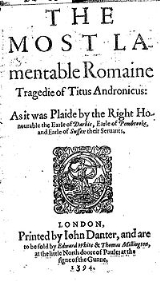
Titus Andronicus
Titus Andronicus is believed to be the earliest tragedy by William Shakespeare, ca. 1584-1590, about a fictional Roman general in a cycle of revenge against the queen of the Goths. It is Shakespeare's bloodiest and most violent play.
Act I
- Sweet mercy is nobility's true badge.
- Tamora, scene i
- In peace and honour rest you here, my sons;
Rome's readiest champions, repose you here in rest,
Secure from worldly chances and mishaps!
Here lurks no treason, here no envy swells,
Here grow no damned drugs, here are no storms,
No noise, but silence and eternal sleep:
In peace and honour rest you here, my sons!- Titus Andronicus, scene i
- Variant line: Here grow no damned grudges, here are no storms,
- Content thee, prince; I will restore to thee
The people's hearts, and wean them from themselves.- Titus Andronicus, scene i
- The dismall'st day is this that e'er I saw,
To be dishonour'd by my sons in Rome!
Well, bury him, and bury me next.- Titus Andronicus, scene i
- My lord, be rul'd by me, be won at last;
Dissemble all your griefs and discontents.
You are but newly planted in your throne;
Lest, then, the people, and patricians too,
Upon a just survey, take Titus' part,
And so supplant you for ingratitude,
(Which Rome reputes to be a heinous sin,)
Yield at entreats; and then let me alone:
I'll find a day to massacre them all,
And raze their faction and their family,
The cruel father and his traitorous sons,
To whom I sued for my dear son's life;
And make them know, what 't is to let a queen
Kneel in the streets and beg for grace in vain. —
Come, come, sweet Emperor. — Come, Andronicus. —
Take up this good old man, and cheer the heart
That dies in tempest of thy angry frown.- Tamora, scene i
Act II
- She is a woman, therefore may be woo'd;
She is a woman, therefore may be won;
She is Lavinia, therefore must be lov'd.
What, man! more water glideth by the mill
Than wots the miller of; and easy it is
Of a cut loaf to steal a shive.- Demetrius, scene i
Act V
- Even now I curse the day, — and yet, I think,
Few come within the compass of my curse, —
Wherein I did not some notorious ill;
As kill a man, or else devise his death;
Ravish a maid, or plot the way to do it;
Accuse some innocent, and forswear myself;
Set deadly enmity between two friends;
Make poor men's cattle break their necks;
Set fire on barns and hay-stacks in the night,
And bid the owners quench them with their tears.
Oft have I digg'd up dead men from their graves,
And set them upright at their dear friends' doors,
Even when their sorrows almost were forgot;
And on their skins, as on the bark of trees,
Have with my knife carved in Roman letters,
Let not your sorrow die, though I am dead.
Tut, I have done a thousand dreadful things
As willingly as one would kill a fly;
And nothing grieves me heartily indeed,
But that I cannot do ten thousand more.- Aaron, scene i
